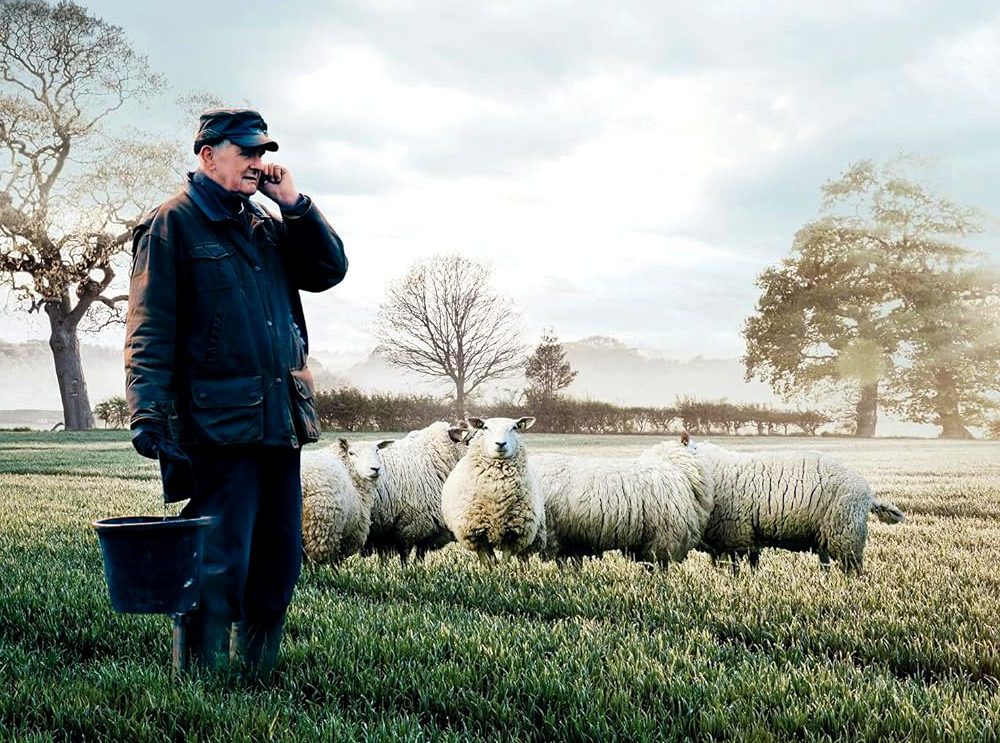The Old Man and the Land depicts a worn-out sheep farmer going about his dreary business as the seasons pass, darkly and dankly. He does it because he’s always done it, and because he doesn’t trust his 42-year-old daughter, Laura, despite her farming skills, or his 40-year-old son, David, the farm’s heir but an alcoholic and drug user who is unsuited to the work, to take it over.
Played by the craggy non-professional actor Roger Marten, frequently shot in closeup, the farmer, a solitary widower, never speaks. Played by Emily Beecham and Rory Kinnear, Laura and David, each of whom covets the farm, never appear. Their speech is primarily conveyed through imploring phone calls to their dad and mostly antagonistic calls to each other.
A worthy experimental film, The Old Man and the Land was directed by the London-based artist Nick Parish. It was written by Nico Mensinga, who previously wrote the scripts for the short Happy Birthday to Me (2014) and Daphne (2017), both directed by Peter Mackie Burns and starring Beecham. (Pictured below: Roger Marten).
 The film counterpoints the numbing monotony of the farmer’s chores with the melodrama of Laura and David’s distant interactions with him. Though it’s galling not to see Beecham and Kinnear on screen, their radio-style performances are persuasive, despite some of their monologues, which range from hectoring to apologetic, seeming overly precise. To his macho dad’s chagrin, “softie” David studied English literature at university, but that’s no reason why his tirades, some of them drunken, should be so well-manicured.
The film counterpoints the numbing monotony of the farmer’s chores with the melodrama of Laura and David’s distant interactions with him. Though it’s galling not to see Beecham and Kinnear on screen, their radio-style performances are persuasive, despite some of their monologues, which range from hectoring to apologetic, seeming overly precise. To his macho dad’s chagrin, “softie” David studied English literature at university, but that’s no reason why his tirades, some of them drunken, should be so well-manicured.
The Old Man and the Land's strength resides in the wealth of hurt it unveils. The disinherited Laura, who initially makes her calls from abroad before she returns to the UK to go to agricultural college in hope that Dad will suddenly give her the farm, faces the ignominy of never being able to do the work she is capable of doing and feels is her birthright.
David, who was traumatically humiliated by their dad in the past, craves his approval, but is eventually driven to remind him of the damage he did to the family, psychologically and physically; the dead mother, who was a victim, is the film’s structuring absence. Something unexpected meanwhile occurs in David’s life that forces him to becomes responsibile. Can he change? Can Laura be more accepting of him and overcome her disappointment?
The Old Man and the Land tells a convincing story of a broken family, but the storytelling is infinitely stronger than the images, which – though meticulously crafted and often elliptically framed, like the films of Robert Bresson – become the visual equivalent of background noise. It may be a movie, but the play's the thing.
- More film reviews on theartsdesk















Add comment